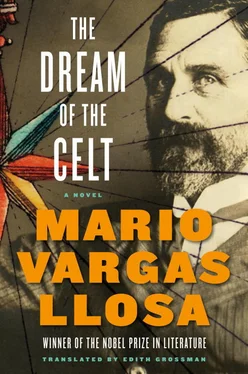As the years passed—eighteen had gone by since the expedition carried out under Stanley’s leadership in 1884—Roger reached the conclusion that the hero of his childhood and youth was one of the most unscrupulous villains the West had excreted onto the continent of Africa. In spite of that, like everyone who had worked under his command, he could not fail to acknowledge his charisma, his affability, his magic, that mixture of temerity and cold calculation with which the adventurer accumulated great feats. He came and went through Africa, on one hand sowing desolation and death—burning and looting villages, shooting natives, flaying the backs of his porters with the chicotes made of strips of hippopotamus hide that had left thousands of scars on ebony bodies throughout Africa—and on the other opening routes to commerce and evangelization in immense territories filled with wild beasts, predatory insects, and epidemics, which seemed to respect him like one of those titans of Homeric legends and biblical histories.
“Don’t you sometimes feel remorse, have a bad conscience because of what we’re doing?”
The question burst from the young man’s lips in an unpremeditated way. And he could not take it back. The flames from the bonfire in the center of the camp crackled as small branches and imprudent insects burned there.
“Remorse? A bad conscience?” The head of the expedition wrinkled his nose and the expression on his freckled, sunburned face soured, as if he never had heard those words and was trying to guess what they meant. “For what?”
“For the contracts we have them sign,” said young Roger, overcoming his embarrassment. “They place their lives, their villages, everything they have, in the hands of the International Congo Society. And not one of them knows what he’s signing because none of them speaks French.”
“If they knew French, they still wouldn’t understand those contracts.” The explorer laughed his frank, open laugh, one of his most amiable attributes. “I don’t even understand what they mean.”
He was a strong, very short man, almost a midget, still young, with an athletic appearance, flashing gray eyes, thick mustache, and an irresistible personality. He always wore high boots, a pistol at his waist, and a light jacket with a good number of pockets. He laughed again, and the overseers of the expedition, who with Stanley and Roger drank coffee and smoked around the fire, laughed too, adulating their leader. But Roger did not laugh.
“I do, though it’s true the rigmarole they’re written in seems intentional, so they won’t be understood,” he said, respectfully. “It comes down to something very simple. They give their lands to the AIC in exchange for promises of social assistance. They pledge to support the construction projects: roads, bridges, docks, factories. To supply the labor needed for the camps and public order and feed the officials and workers for as long as the work continues. The Society offers nothing in return. No salaries, no compensation. I always believed we were here for the good of the Africans, Mr. Stanley. I’d like you, whom I’ve admired since I was a boy, to give me reasons to go on believing it’s true. That these contracts are, in fact, for their good.”
There was a long silence, broken by the crackling of the fire and occasional growls of night animals out hunting for food. It had stopped raining a while ago but the atmosphere was still humid and heavy, and it seemed that all around them everything was germinating, growing, becoming dense. Eighteen years later, in the disordered images the fever sent whirling around his head, Roger recalled the look, inquisitive, surprised, mocking at moments, with which Henry Morton Stanley inspected him.
“Africa wasn’t made for the weak,” he said at last, as if talking to himself. “The things that worry you are signs of weakness. In the world we’re in, I mean. This isn’t the United States or England, as you must realize. In Africa the weak don’t survive. They’re finished off by bites, fevers, poisoned arrows, or the tsetse fly.”
He was Welsh but must have lived a long time in the United States, because his English had North American tonalities, expressions, and turns of phrase.
“All of this is for their good, of course it is,” Stanley added with a movement of his head toward the circle of conical huts in the hamlet on whose outskirts their camp was located. “Missionaries will come to lead them out of paganism and teach them that a Christian shouldn’t eat his neighbor. Physicians will vaccinate them against epidemics and cure them better than their witch doctors. Companies will give them work. Schools will teach them civilized languages. They’ll be taught how to dress, how to pray to the true God, how to speak like a Christian and not use those monkey dialects. Little by little their barbaric customs will be replaced by those of modern, educated people. If they knew what we’re doing for them, they’d kiss our feet. But mentally they are closer to the crocodile and the hippopotamus than to you or me. That’s why we decide what is good for them and have them sign those contracts. Their children and grandchildren will thank us. And it wouldn’t surprise me if in a little while they begin to worship Leopold the Second the way they worship their fetishes and hideous objects.”
Where on the great river was that camp? He thought vaguely it was between Bolobo and Chumbiri and the tribe belonged to the Bateke. But he wasn’t sure. That data appeared in his diaries, if you could give that name to the hodgepodge of notes scattered in notebooks and on loose sheets of paper over the course of so many years. In any event, he remembered that conversation clearly, as well as his uneasiness when he lay down on his cot after the exchange with Henry Morton Stanley. Was that the night his personal holy trinity of the three Cs began to fall apart? Until then he had believed they justified colonialism: Christianity, civilization, and commerce. From the time he was a modest assistant accountant at the Elder Dempster Line in Liverpool, he had assumed there was a price to pay. It was inevitable that abuses would be committed. Among the colonizers there would be not only altruists such as Dr. Livingstone but abusive scoundrels as well, but in the final analysis, the benefits would far outweigh the harm. Life in Africa was showing him that things were not as clear as they had been in theory.
In the year he worked in the explorer’s service, still admiring the audacity and ability to command with which Henry Morton Stanley led his expedition through the largely unknown territory bordering the Congo River and its myriad tributaries, Roger also learned that the explorer was a walking mystery. The things said about him were always contradictory, so it was impossible to know which were true and which false and how much exaggeration and fantasy were in the true statements. He was one of those men incapable of differentiating reality from fiction.
The only clear thing was that the idea of Stanley as a great benefactor to the natives did not correspond to the truth. He learned this listening to the overseers who had accompanied Stanley on his journey of 1871 in search of Dr. Livingstone, an expedition, they said, much less peaceable than this one, on which, no doubt following the instructions of Leopold II, he proved to be more careful in his dealings with the tribes whose chieftains—450 in all—he had sign the allocation of their lands and workforce. The things those rough men, dehumanized by the jungle, recounted of the expedition of 1871 made his hair stand on end. Villages decimated, chiefs decapitated, their women and children shot if they refused to feed the members of the expedition or provide them with porters, guides, and men to cut trails through the jungle. These old associates of Stanley feared him and accepted his reprimands in silence and with their eyes lowered. But they had blind confidence in his decisions and spoke with religious reverence of his famous 999-day journey, between 1874 and 1877, when all the other whites and a good part of the Africans had died.
Читать дальше












